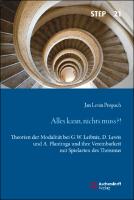Alles kann, nichts muss?!
Theorien der Modalität bei G. W. Leibniz, D. Lewis und A. Plantinga und ihre Vereinbarkeit mit Spielarten des Theismus
| dc.contributor.author | Propach, Jan Levin | |
| dc.date.accessioned | 2022-02-03T13:44:16Z | |
| dc.date.available | 2022-02-03T13:44:16Z | |
| dc.date.issued | 2020 | |
| dc.identifier | OCN: 1300794682 | |
| dc.identifier.uri | https://library.oapen.org/handle/20.500.12657/52645 | |
| dc.description.abstract | Can God do what He wants or does God want what is in accordance with His very own nature? Is God bound by necessary principles or is necessary what God decrees? Such questions about the relationship between modalities and concepts of God are part of innumerable debates and reach far into the history of philosophy and theology. This study first examines the modal metaphysics of G.W. Leibniz's, D. Lewis' and A. Plantinga's metaphysics together with their very different ontological frameworks. Subsequently, the different forms of theism within contemporary debates within Analytic Philosophy are analyzed: classical and personal theism and panentheism. The heart of this study will be the analysis of the consistencies and inconsistencies that appear when, for metaphysical and ontological reasons, one wants to connect the different forms of theism with the modal theories of Lewis, Leibniz, or Plantinga. | en_US |
| dc.language | German | en_US |
| dc.subject.classification | thema EDItEUR::Q Philosophy and Religion::QR Religion and beliefs::QRA Religion: general::QRAB Philosophy of religion | en_US |
| dc.subject.other | Leibniz; Philosophiegeschichte der Frühen Neuzeit; Early Modern Philosophy; Ideen; Ideas; Mögliche Welten; Possible Worlds; Theismus; Theism; Analytische Metaphysik; Analytic Metaphysics; Religionsphilosophie; Philosophy of Religion; Analytische Philosophie; Analytic Philosophy | en_US |
| dc.title | Alles kann, nichts muss?! | en_US |
| dc.title.alternative | Theorien der Modalität bei G. W. Leibniz, D. Lewis und A. Plantinga und ihre Vereinbarkeit mit Spielarten des Theismus | en_US |
| dc.type | book | |
| oapen.abstract.otherlanguage | Kann Gott tun, was er will oder will Gott, was seinem Wesen entspricht? Ist Gott an notwendige Prinzipien gebunden oder ist notwendig, was Gott dekretiert? Derartige Fragen nach dem Verhältnis von Modalitäten und Gotteskonzepten sind Bestandteil unzähliger Debatten und reichen weit in die Philosophie- und Theologiegeschichte zurück. Die vorliegende Studie untersucht zunächst die Modalmetaphysiken G.W. Leibniz’, D. Lewis’ und A. Plantingas samt ihren sehr unterschiedlichen ontologischen Voraussetzungen. Im Anschluss werden die in der gegenwärtigen analytisch-religionsphilosophischen Debatte dominanten Formen des Theismus analysiert: der klassische und personale Theismus und der Panentheismus. Das Kernstück dieser Studie bildet die Analyse von Konsistenzen und Inkonsistenzen, die zutage treten, will man aus metaphysisch-ontologischen Gründen diese unterschiedlichen Formen des Theismus mit den Modaltheorien Lewis’, Leibniz’ oder Plantingas verbinden. | en_US |
| oapen.identifier.doi | 10.17438/978-3-402-11849-8 | en_US |
| oapen.relation.isPublishedBy | fb17cfa5-9e40-4113-a5ce-80325c535538 | en_US |
| oapen.relation.isFundedBy | 631ac483-8bae-460f-9987-c3f4e4b98bb5 | en_US |
| oapen.relation.isbn | 9783402118306 | en_US |
| oapen.pages | 294 | en_US |
| oapen.place.publication | Münster | en_US |
| oapen.grant.project | DFG |

